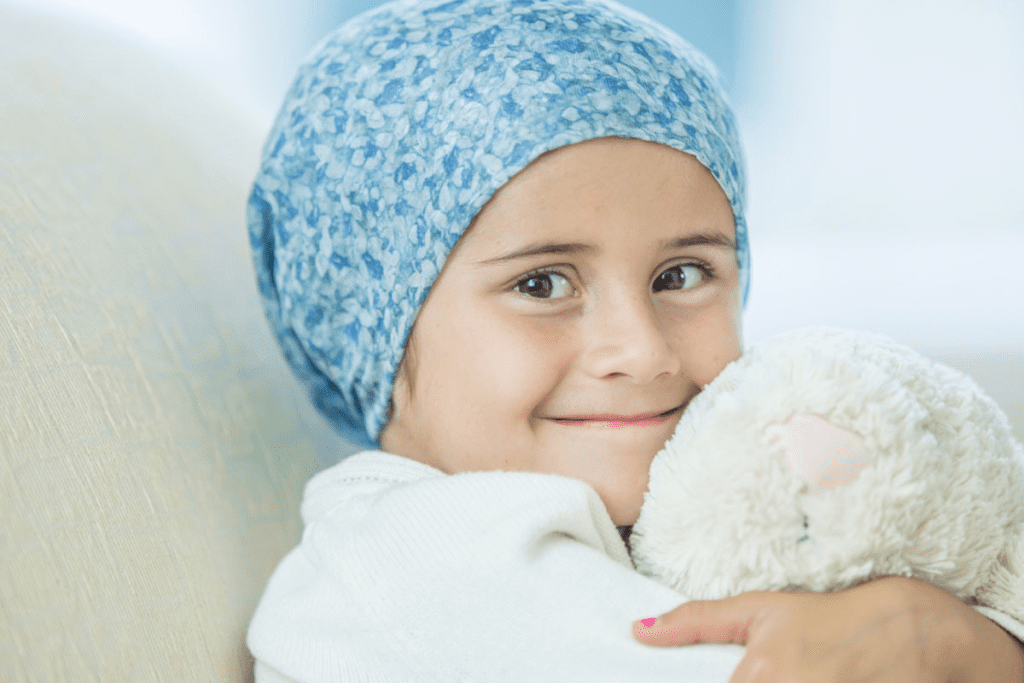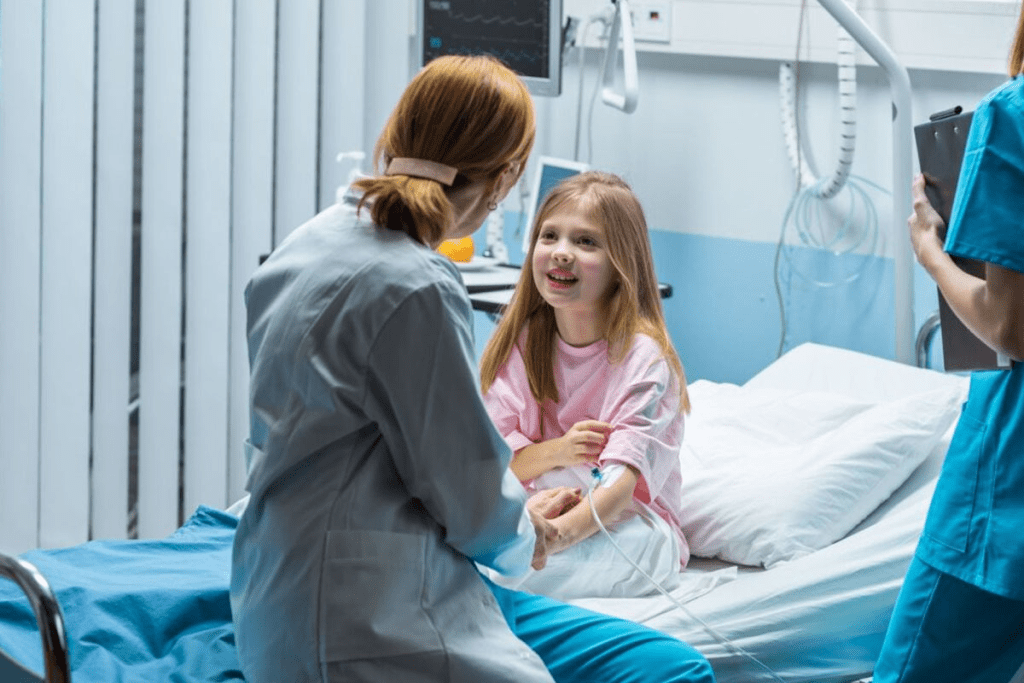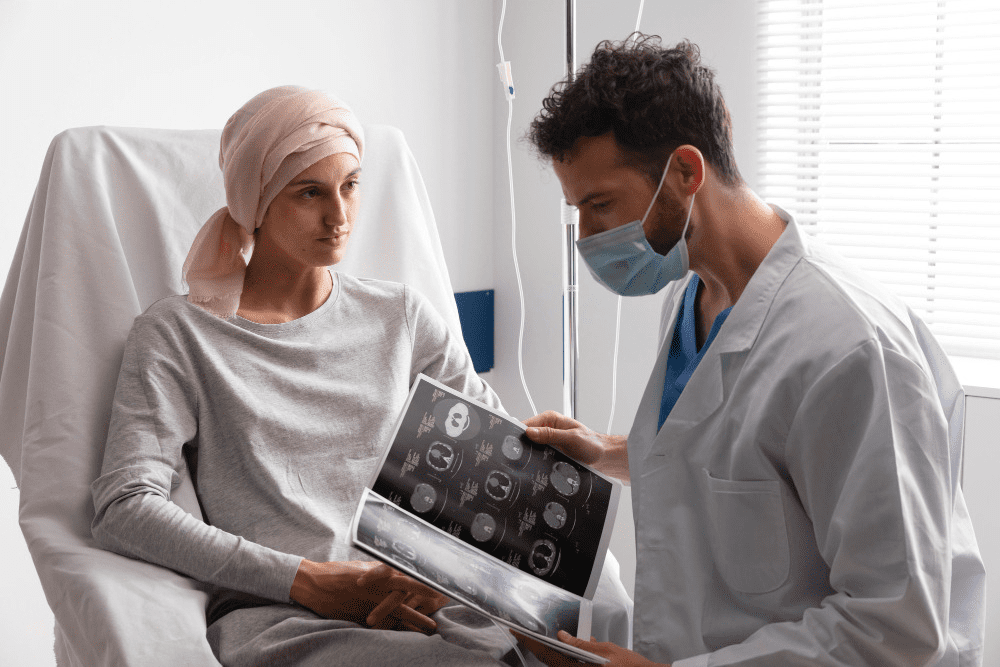Last Updated on October 20, 2025 by
As we work to improve survival rates for kids with childhood cancer, we face new challenges. Up to 90% of these survivors deal with late effects from radiation therapy. These effects can change their lives forever.

Late effects after cancer treatment can lead to chronic health problems and serious complications. Studies show that 60% to over 90% of survivors develop at least one long-term condition, while 20% to 80% experience severe or life-threatening issues in adulthood. These may include neurocognitive decline, hormonal deficiencies, and fertility challenges. Raising awareness about these risks is crucial, as preventive care and monitoring can help survivors live healthier lives. Addressing the long-term consequences of cancer treatment, especially radiation therapy, allows healthcare providers to improve patient outcomes and overall quality of life for childhood and adult cancer survivors.
Learning about radiation therapy in treating pediatric cancer is key to better patient care. Pediatric cancer treatment is now more complex. It involves different therapies for each child. Radiation therapy is a big part of this, helping with leukemia, lymphoma, and brain tumors.
Radiation therapy is very important in treating kids with cancer. It helps control tumors and lower the chance of cancer coming back. It’s often used with other treatments like chemotherapy and surgery. The choice to use radiation depends on the cancer type, stage, and the child’s health.
The risk of serious side effects from radiation therapy depends on several things. These include the radiation dose, how long it’s used, where it’s applied, and the child’s age. Knowing these factors helps in finding ways to lessen severe side effects.
Radiation therapy can greatly affect brain development and function in young children. Cognitive impairment is a common side effect, which can affect learning and school performance. The risk of cognitive problems depends on the radiation dose, where it’s applied, and the child’s age at treatment.
Exploring the late effects of radiation therapy shows its big impact on the endocrine system of kids who’ve had cancer. This therapy can harm the endocrine system, causing problems years later.
The hypothalamic-pituitary axis is very sensitive to radiation damage. This can cause hormonal shortages, affecting kids’ growth and development. Growth hormone deficiency is a common problem after radiation therapy.
Radiation therapy can also cause cardiovascular late effects, like heart disease and vascular damage. These risks are higher for those who got radiation to the chest.

Pulmonary fibrosis is another risk from radiation therapy, mainly for kids who got radiation to the chest. This can cause breathing problems and affect their quality of life.
Knowing the incidence rates and latency periods for endocrine system complications is key for follow-up care. The risk depends on the dose and location of radiation therapy.
It’s vital to stress the need for long-term follow-up care for kids who’ve had cancer and radiation therapy. This helps catch and manage complications early, improving their quality of life.
Survivors of pediatric cancer may face fertility issues due to radiation therapy. This therapy is key in treating many childhood cancers. It can affect their reproductive health in different ways. We will look at how radiation impacts fertility and the options for preserving it before treatment starts.
Many pediatric cancer patients worry about keeping their fertility. Luckily, there are ways to preserve fertility before radiation therapy. Fertility preservation techniques like freezing eggs or sperm, or freezing ovarian or testicular tissue, offer hope. It’s important for patients and their families to talk to their healthcare provider about these options.
The right fertility preservation method depends on several factors. These include the patient’s age, the type of cancer, and the radiation dose to reproductive organs. Advances in fertility preservation have given many young cancer patients hope for their future fertility.

It’s vital to understand how radiation therapy can affect fertility and reproductive health in pediatric cancer survivors. By exploring fertility preservation options before treatment, we can lessen some long-term effects of cancer therapy.
Pediatric cancer survivors may face musculoskeletal and dental issues as adults. These problems come from radiation therapy. It’s vital to follow up on their health long-term.
Radiation can harm teeth and facial growth in kids with cancer. Dental and craniofacial complications include missing teeth, cavities, and odd-shaped teeth. The severity depends on the radiation dose, the patient’s age, and the area treated.
Craniofacial abnormalities from radiation can cause facial imbalance and jaw issues. These problems can make eating and speaking hard.
Dealing with these issues needs a team effort. Pediatric dentists, orthodontists, and others play key roles. Early treatment and regular check-ups are key to improving survivors’ lives.
The emotional toll of these physical changes is significant. Survivors may feel psychological distress about their looks and abilities. This shows the importance of ongoing support in their care.
The journey of a pediatric cancer survivor goes beyond treatment. Many face mental health challenges that need support and understanding. As survival rates improve, we must tackle the late effects of childhood cancer treatment and their impact on quality of life.
Survivors of pediatric cancer may deal with anxiety, depression, and PTSD. These issues come from the trauma of cancer treatment, including radiation therapy, and life changes.
Mental health challenges are a big worry for pediatric cancer survivors. Studies show they face a higher risk of mental health problems than their peers. The long-term complications of radiation therapy can harm both their physical and mental health.
It’s key to offer care that includes psychological support and counseling. This helps survivors deal with their experiences and boosts their quality of life. We must also make healthcare providers aware of the mental health needs of pediatric cancer survivors.
Understanding the psychosocial impact of cancer treatment and providing support can improve survivors’ quality of life. It’s a team effort involving the medical community, families, and communities. Together, we can ensure survivors get the care they need to thrive.
Radiation therapy has gotten better for kids with cancer. But late effects like secondary cancers and brain problems are a big worry. Researchers are working hard to make treatments safer.
They’re looking into proton therapy, which might lower the risk of secondary cancers. Studies show proton therapy pencil beam scanning is safer than old methods.
We need to keep finding ways to reduce late effects without losing treatment effectiveness. This will help kids with cancer live better lives and avoid long-term problems.
Kids who have had radiation therapy might face many late effects. These include problems with thinking and learning, hormone issues, fertility problems, heart and lung issues, bone and muscle problems, and a higher chance of getting cancer again.
Radiation therapy can harm brain development. It can cause problems with thinking, learning, and memory. These effects can last a long time.
Radiation therapy can mess up the endocrine system. This can cause hormone problems, growth issues, and other complications. The risk and timing of these problems depend on the dose and where the radiation was given.
Yes, radiation therapy can harm fertility and reproductive health. There are ways to preserve fertility before treatment to lessen these effects.
Radiation therapy can cause dental and facial problems, as well as other bone and muscle issues. These problems can affect a survivor’s quality of life.
Radiation therapy can have a big impact on mental health. Many survivors face mental health challenges. There are strategies to help improve their quality of life.
Researchers are working on new ways to use radiation therapy. They aim to reduce late effects and improve survivors’ quality of life.
Yes, some factors like the dose and where the radiation is given can increase the risk of severe complications. Knowing these risk factors helps in finding ways to prevent or lessen these effects.
While we can’t completely prevent secondary cancers from radiation, regular check-ups can help catch them early. This can improve treatment outcomes.
Radiation therapy can cause kidney damage and problems. Survivors should be watched for these possible late effects.
Yes, new advances in radiation therapy can lower the risk of late effects. These improvements can also lead to better treatment outcomes for kids with cancer.
Subscribe to our e-newsletter to stay informed about the latest innovations in the world of health and exclusive offers!